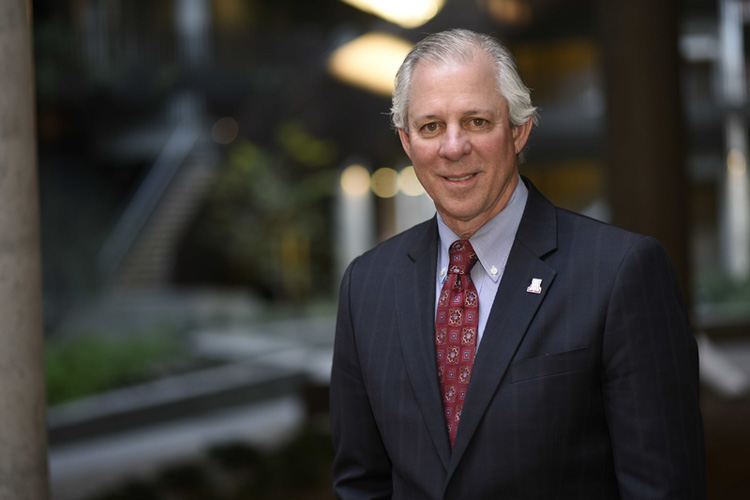When it comes to driving Tucson’s growth, Sun Corridor Inc.’s leadership doesn’t simply sit back, relax and wait for the magic to happen. They make it happen. It’s understandable in light of the leadership that comprises the organization’s Chairman’s Circle and board of directors.
Sun Corridor’s collegiate presidents, government representatives, CEOs and other notable business leaders propel Sun Corridor Inc.’s economic development — aggressively and collaboratively. From some of the most ambitious minds, strategies pour forth to invigorate and draw top industries to Tucson and Southern Arizona.
No wallflowers
Who makes up Sun Corridor Inc.’s leadership? They are David Hutchens, president and CEO of UNS Energy Corp, Tucson Electric Power & UniSource Energy Services; Bonnie Allin, Tucson Airport Authority’s president and CEO; Robert Robbins, University of Arizona’s president; Michael Crow, Arizona State University’s president; Fletcher McCusker, the CEO of UAVenture Capital; and a who’s who of Arizona thought leaders.
They come from different backgrounds and from various industries, but what they all have in common is the drive to push Tucson’s “economic blueprint.”
“The Chairman’s Circle isn’t comprised of wallflowers,” says Hutchens, Sun Corridor Inc.’s chair. “They all work for the good of the community. Partnerships are the most critical component of Sun Corridor Inc. As a collaborative community, it’s important for us to have representatives in education, government, business and the general public.”
The results of this steadfast collaboration has not only developed Sun Corridor Inc.’s economic blueprint to facilitate job growth and economic growth in Southern Arizona, but it’s also helped define and foster competitive industry targets. These economic development focal points include aerospace and defense, bioscience and diagnostics, transportation and logistics, and renewable and mining technology.
Sun Corridor Inc. and the beanstalk
Sun Corridor Inc. may not have actual magical properties, but in many ways the organization has become akin to Jack’s beanstalk — strong, reliable and leading to something grand and impressive.
“When we have a specific skill set or specific workforce needed for a particular industry, we go after it and we do it with great success,” Hutchens says. “Workforce is always the No. 1 thing folks are looking for. The cluster of industries we’re targeting already has a critical mass here. People will move here because there are other aerospace, defense and bioscience jobs available.”
When Sun Corridor Inc.’s economic development crew realized that Tucson was competing with Ann Arbor, Mich., and Boulder, Colo., for Accelerate Diagnostics, they initially felt as if they were on the outside looking in, according to Sun Corridor President and CEO Joe Snell.
“Accelerate Diagnostics needed a specific kind of ‘clean room,’ which we didn’t have at the time,” Snell says. “So, we built a clean room. It’s not always what’s off the shelf. We’re in the business of why we can — not why we can’t.”
Accelerate Diagnostics is simply one example of Tucson staking claim on businesses seeking to relocate through creative vision.
Another example is the establishment of technology and bioscience incubators, such as Oro Valley Innovation Labs. The 4,000 square feet of lab and office space is dedicated specifically for bioscience startups and is near Roche Tissue Diagnostics in Innovation Park.
“We want to be the leaders in the fourth industrial revolution,” says UA President Robbins. “We have a new director at UA Tech Park and we are focusing our research efforts on what we’re really good at — technology, aerospace, health and engineering.”
The UA Tech Park is as much a significant research entity to Tucson as it is an economic driver. Home to more than 40 companies and organizations, including Raytheon, UnitedHealth Group/OptumRx, and others, UA Tech Park generates $50 million annually in state and local taxes, with the average park employee’s annual wage set at $91,145.
“The use of artificial intelligence in medicine is going to be massive,” adds Robbins. “Siemens, Philips and General Electric are spending millions on algorithms. That’s all going to be very good for economic development in the state.”
As AI continues to become more mainstream, Tucson’s autonomous vehicle research and dominance continue. One particular exciting addition to this realm is TuSimple, a Chinese company that develops self-driving commercial trucks.
“As a startup story, TuSimple’s is quite unique,” Hutchens says, “They’ve already had two groundbreakings in Tucson and are planning to add 500 jobs over the next two years.”
Digging deep and flying high
“Mining is and will continue to have a huge economic impact in Southern Arizona,” Hutchens says. “Caterpillar chose Tucson because of the mines.”
Caterpillar isn’t the only one. Hexagon Mining, an information technology provider of planning, operations and safety solutions for the mining industry, also chose to establish roots in Tucson. The company’s new 26,000-square-foot facility will house 140 Hexagon Mining employees, with plans for an additional 120 jobs over the next five years.
Aerospace, near space and defense, alongside mining will continue to drive the economy and high-wage employment opportunities for Southern Arizona.
“It’s all about retaining our bases and remaining ready for the missions that we currently have and could have,” Hutchens says. “We make sure they have all the support from community, state and federal sources to get the funding they need.”
Davis-Monthan Air Force Base, for example, is the fourth-largest employer in Pima County and the third-largest installation in air combat command, providing $1.5 billion to the local Tucson economy.
“Space and sustainability science will emerge to lead our market in the future,” says McCusker. “Companies are looking to launch and build their own satellites. There’s also space-recovery technology and other related spin-outs gaining traction. Raytheon has placed Tucson in a nice position to be viewed for our aerospace work.”
All in all, Tucson seems to have it all, and not simply in terms of economic development success.
“We have the people we need and we have the education,” Hutchens says. “Southern Arizona sells very well, and not simply from a talent perspective. It offers a beautiful quality of life, weather and recreation. We are a million-plus, but still feel like a small town.”




